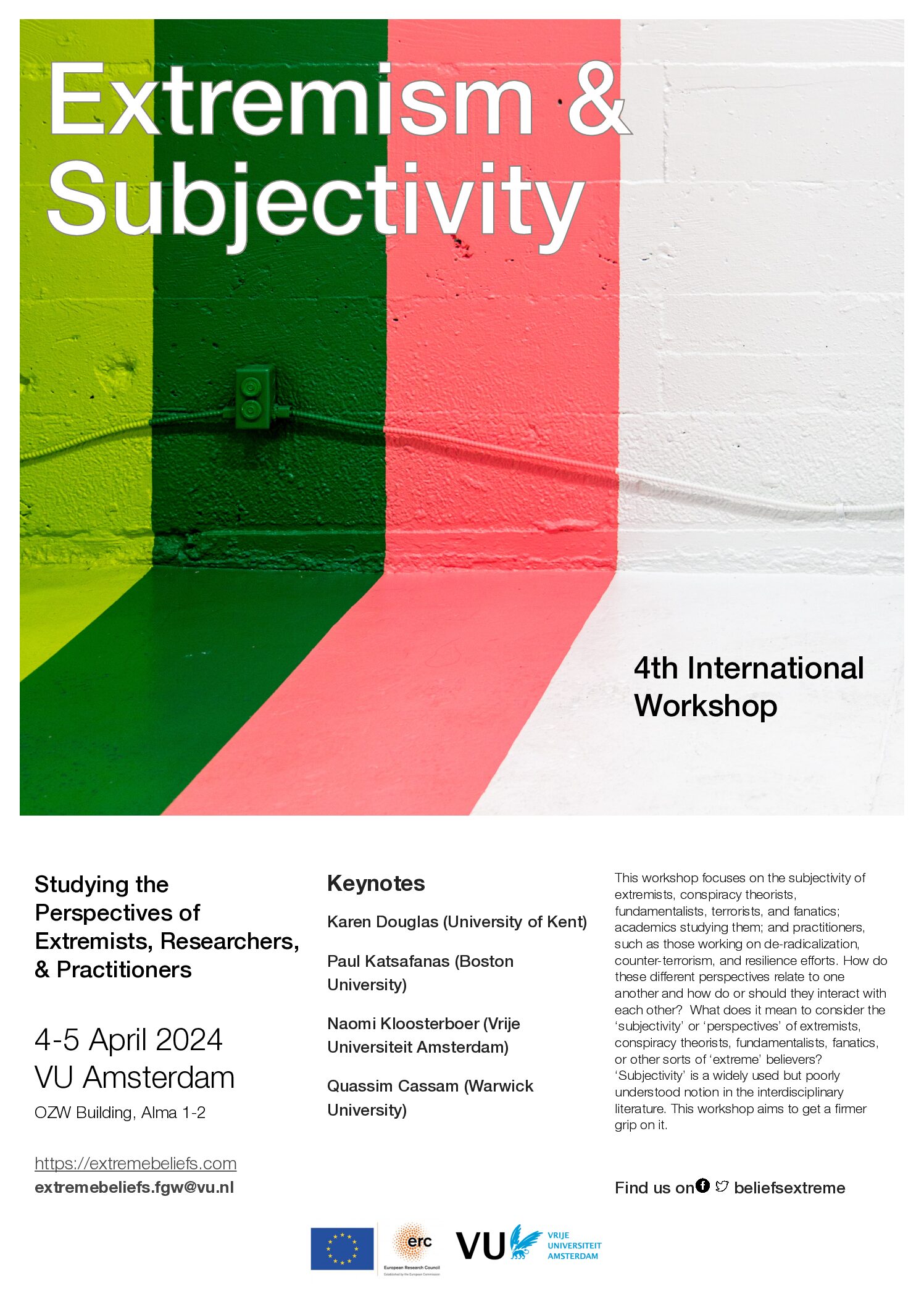
« Go back to: Events
Workshop: ‘Extremism and Subjectivity’ 4-5 April 2024
Locatie: Hybrid: Vrije Universiteit Amsterdam and Zoom

Description
The Extreme Beliefs team is planning an Interdisciplinary Workshop Extreme Belief and Subjectivity, to be held at the Vrije Universiteit Amsterdam (The Netherlands) on the 4th and 5th of April 2024.
This workshop focuses on the subjectivity and perspectives of three groups of people. First, extremists, conspiracy theorists, fundamentalists, terrorists, and fanatics. Second, academics studying extremism, conspiracy theory, fundamentalism, and related phenomena. Third, practitioners, such as those working in de-radicalization programs, counter-terrorism measures, and resilience efforts. How do these different perspectives relate to one another and how do or should they interact with each other? What does it mean to consider the ‘subjectivity’ or ‘perspectives’ of extremists, conspiracy theorists, fundamentalists, fanatics, or other sorts of ‘extreme’ believers? Why, if at all, should it be done? ‘Subjectivity’ is a widely used but poorly understood notion in the interdisciplinary literature, so this conference aims to get a firmer grip on it. Relevant questions include:
- Why is it theoretically and practically important to engage with the subjectivity of conspiracy theorists, extremists, or fundamentalists? What does it mean to engage with their perspectives or subjectivity? When (if at all) is engagement necessary and why?
- What constitutes a person’s subjectivity anyway? How should we understand subjectivity, exactly in these contexts?
- What is the role of the thinker’s affections, passions, and beliefs in causing and sustaining their extremism or fundamentalism? What about grievances, resentment, or anger, among others?
- What (if any) is the role of religiosity? (How should we understand what religiosity consists in?) What work can it do as an explanatory factor for extreme, conspiracy theoretic, and fundamentalist beliefs or behavior?
- What role (if any) do epistemic and moral virtues and vices play in a person’s subjectivity and how do these notions help us to understand fundamentalism, extremism, or terrorism?
- Which senses of ‘rationality’, ‘justification’, ‘reasonableness’ and similar terms can be applied to individual extremists and groups of extremists, fundamentalists, and conspiracy theorists and what (if anything) does that mean for how researchers study their subjectivity?
- Can researchers or practitioners ‘see’ what matters to extremists, fundamentalists, conspiracy theorists, or terrorists – their goals, motivations, or reasons – from their point of view? What are the ethical implications of (not) trying to do so?
Registration:
Please register by filling out this form. You can register until April 1st for Zoom participation; there is no place live left at the workshop at the VU.
Program and format:
A two-day workshop with sessions consisting of 4 keynote lectures and 12 additional lectures. The focus will be on face-to-face meetings, but there will be room for online participation. Download the (NEW) Program Extremism and Subjectivity here.
Keynotes:
Karen Douglas (University of Kent)
Quassim Cassam (Warwick University
Paul Katsafanas (Boston University)
Naomi Kloosterboer (VU Amsterdam)
Venue:
OZW Building
VU Amsterdam
Boelelaan 1109
1081 HV Amsterdam, The Netherlands
Organizers:
Chris Ranalli, Quassim Cassam, Rik Peels, and Anna Haase.
About:
The workshop is part of a series of workshops facilitated by the Extreme Beliefs: The Epistemology and Ethics of Fundamentalism project at the Vrije Universiteit Amsterdam. The project is funded by the European Union’s Horizon 2020 Research and Innovation Program (Grant Agreement No. 851613).